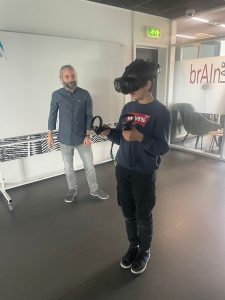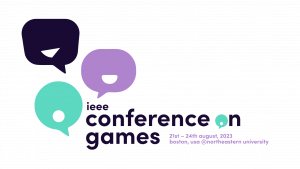Julie and Gino will be at CHI 2025 in Yokohama to present their poster on eliciting emotions in LLMs. You can read the preprint of the full paper on Arxiv at Don’t Get Too Excited — Eliciting Emotions in LLMs. If you are attending CHI too, make sure to stop by and chat with our brilliant students!
Category Archives: News
New Generations Visiting
On Tuesday, we welcomed a group of students from the International School of Hellerup. They had a tour of the IT University of Copenhagen, the Game lab and the brAIn lab, where they enjoyed some immersive VR experiences and a peak into our research. It was a great experience for the students and us, hopefully igniting the spark of curiosity in future scientists.

Update from the lab
Busy times at the lab since the opening, we have welcomed two new members and started exciting new projects.
Since last summer, we have participated in the IEEE Conference on Games ’24, where we presented our work titled Playing With Neuroscience and gave a tutorial on how to conduct psychophysiological studies in games. We have presented our works Exploring Deep Learning Models for EEG Neural Decoding at ACAIN ’24 in Italy, Children’s Expressed Emotions During Playful Learning Games at the European Conference on Game-Based Learning in Aarhus, and we are looking forward to CHI ’25, where we will be presenting our work Don’t Get Too Excited – Eliciting Emotions in LLMs.
We have a series of new and exciting projects underway in the lab, including some new datasets in emotions, agents and games and a study on the cognitive impacts of programming with AIs. We’ll make sure to keep you posted. In the meantime, you can keep an eye on our publications page on the IT University’s database: https://pure.itu.dk/da/organisations/brain-lab/publications/.
Lab Opening
After a couple of years of “underground” activity, we had our official lab opening last month. You can also find us on the official ITU page: https://en.itu.dk/Programmes/Student-Life/Labs-at-ITU.
Check some of the pictures of the opening event below.
ACG 2023 Talk Video
Laurits’ presentation at the International Conference on Advances in Computer Games is now online and visible at https://youtu.be/5cl-L2UalQQ?si=DNUHXDc0XA7pTgm1&t=1328.
Laurits discusses a study conducted in the context of Maj Frost Jensen‘s bachelor thesis, in which we investigated the role of stress tolerance in influencing the enjoyability of stressful games, and how to capture this relationship through players’ physiology monitoring.
New post-doc position at the ITU brAIn lab
The ITU brAIn lab at the Center for Digital Play is looking for a post-doc to work on the CREATE project with YOLI. You will be joining the lab to investigate how large language models can play games, what these models can understand and how this information can be used to help players.
New research projects and thesis for 2023/24
We just presented the lab at the thesis market last Friday, check the slides with some of the next thesis ideas:
Skip to PDF contentHere are a few of the ideas from the slides, if you can’t see the pdf:
- Create a computational model of the uncanny valley effect using machine learning
- Investigate the application of geometric deep learning to encode the interaction between electrodes in EEG recording
- Create computational models of player experience.
- Can we detect and qualify different players’ emotions and cognitive states while they are playing?
- Can we adapt the gameplay? Can we generate new content driven by the experience? (generative AI in games)
- Investigate how to integrate non-verbal cues into conversation with a conversational AI (e.g. chatGPT)
- How can a virtual agent understand user emotions? Can non-verbal cues used to improve the interaction with virtual characters?
- Test theories of neuroscience & cognitive psychology for information processing
- Multiple timescales in perception & action
- Hierarchical & statistical learning
The team is going to Boston

The team is going to attend the IEEE Conference on Games to present three different research works:
- Investigating the Uncanny Valley Phenomenon Through the Temporal Dynamics of Neural Responses to Virtual Characters:
A study by Chiara Gorlini, Laurits Dixen and Paolo Burelli on finding what processes in the human brain are at the root of the uncanny valley phenomenon - Procedurally generating rules to adapt difficulty for narrative puzzle games:
A prototype of a system to generate educational puzzle games for kindergarten kids by Thomas Volden, Djorje Gribic and Paolo Burelli - Investigating Perceived and Mechanical Challenge in Games Through Cognitive Activity:
A study by Christine Hegedues, Joao Pedro Dias Constantino, Laurits Dixen and Paolo Burelli on what is the impact of game visuals on the perceived challenge and whether it can be captured through EEG
Looking forward to a week of interesting discussions and presentations!